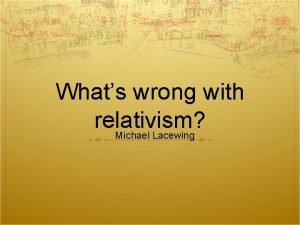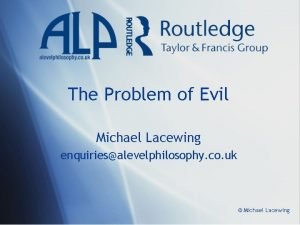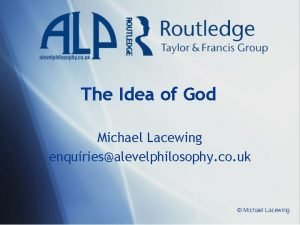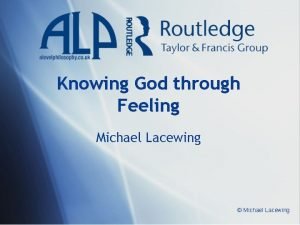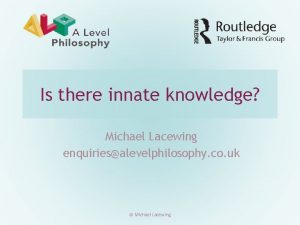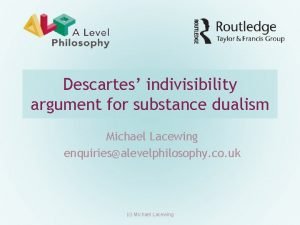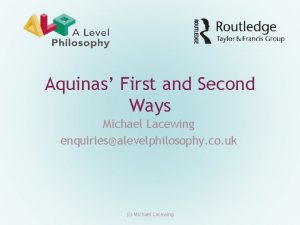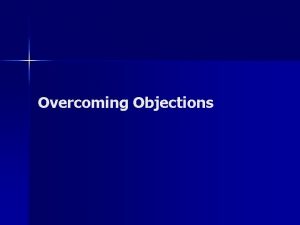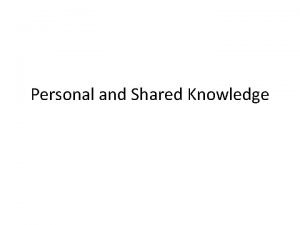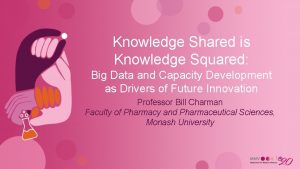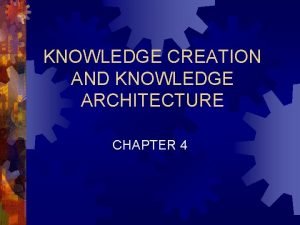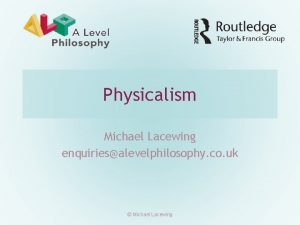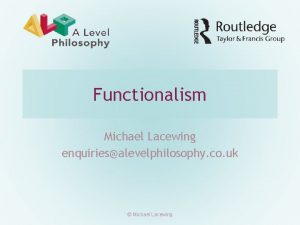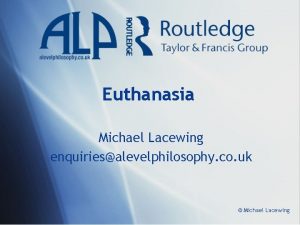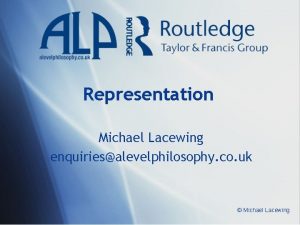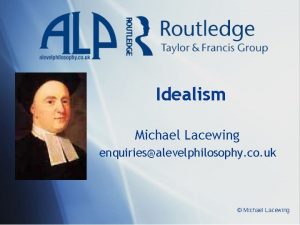Is there innate knowledge Michael Lacewing enquiriesalevelphilosophy co











- Slides: 11

Is there innate knowledge? Michael Lacewing enquiries@alevelphilosophy. co. uk © Michael Lacewing

‘Innatism’ about knowledge • The claim that there is some innate knowledge – The debate is about propositional knowledge not ability knowledge • Innate: not gained from experience, but somehow part of the in-built structure of the mind. – Reason as the faculty of knowledge • Because it is not gained from experience, it is a priori. © Michael Lacewing

Plato’s Meno • Plato demonstrates innate knowledge using the example of a slave boy solving a problem in geometry. • Take a square 2 ft × 2 ft. It has an area of 4 sq ft. How long are the sides of a square with an area of 8 sq ft? © Michael Lacewing

Plato’s Meno • The slave boy, who has not been taught geometry, solves the problem just through Socrates asking a series of questions. • How? He didn’t gain the knowledge from experience, so he must have recovered the answers from within his mind. • The argument for innate knowledge is that we have knowledge that we can’t have gained from experience. • (Socrates then argues that the mind must have existed before birth. ) © Michael Lacewing

Leibniz on necessary truth • A proposition is necessary if it must be true (if it is true), or must be false (if it is false) – 2 + 2 = 4; all squares have three sides. • A proposition that could be true or false is contingent – Of course, it will be either true or false, but the world could have been different – You could have been doing something other than reading this slide. © Michael Lacewing

Necessary truth • Experience tells us how things are, but not how things have to be. • Experience gives us knowledge of particulars, not universals. • So necessary truths must be known a priori. • Because these truths are not conscious, we need to discover them – We do so by attending to ‘what is already in our minds’. © Michael Lacewing

Experience triggers innate knowledge • Since we are not consciously aware of this knowledge from birth, there is some point at which we first come to be aware of it. • Experience ‘triggers’ our awareness of the knowledge. • What is ‘triggering’? – E. g. Birds sing the song of their species after hearing just a small part of it. So it can’t be learned from experience. © Michael Lacewing

Experience triggers innate knowledge • Carruthers: cognitive capacities have genetic base, but develop in response to experience (e. g. language); why not concepts and knowledge? – E. g. around 3– 4 months, babies quickly start thinking of physical objects as something that can exist outside their experience. • Our capacity for thinking about the world (reason) is ‘preshaped’ or ‘predisposed’ towards certain true thoughts. © Michael Lacewing

Alternative explanation • We can object that knowledge that seems innate, because it is not learned from experience, is actually analytic – We acquire the concepts involved from experience – Then in understanding the concept, we come to know the a priori truth. • Reply: but is this explanation plausible? E. g. are mathematical truths analytic? © Michael Lacewing

Two examples • What about geometry, which is about space, not the concept of space? – Reply: geometry divides into definitions and a posteriori claims about which geometry is correct. • What about morality? – Are moral truths analytic? – Or, as Hume argues, is there no moral knowledge because there is no moral truth? © Michael Lacewing

Innatism and empiricism • If innate knowledge doesn’t come from experience, where does it come from? How is it already part of the mind? – Plato: existence before birth – Descartes: God • Empiricist account: Innate knowledge derives from evolution – It is genetically encoded that we will develop the relevant concepts and use the knowledge at a certain point in cognitive development under certain conditions – This development is the product of natural selection. © Michael Lacewing
 Descriptive relativism
Descriptive relativism Michael lacewing
Michael lacewing Michael lacewing
Michael lacewing Michael lacewing
Michael lacewing Michael lacewing
Michael lacewing Descartes indivisibility argument
Descartes indivisibility argument Michael lacewing philosophy
Michael lacewing philosophy Lacewing trial
Lacewing trial Personal vs shared knowledge
Personal vs shared knowledge Knowledge shared is knowledge squared meaning
Knowledge shared is knowledge squared meaning Knowledge shared is knowledge multiplied
Knowledge shared is knowledge multiplied Knowledge creation and knowledge architecture
Knowledge creation and knowledge architecture
